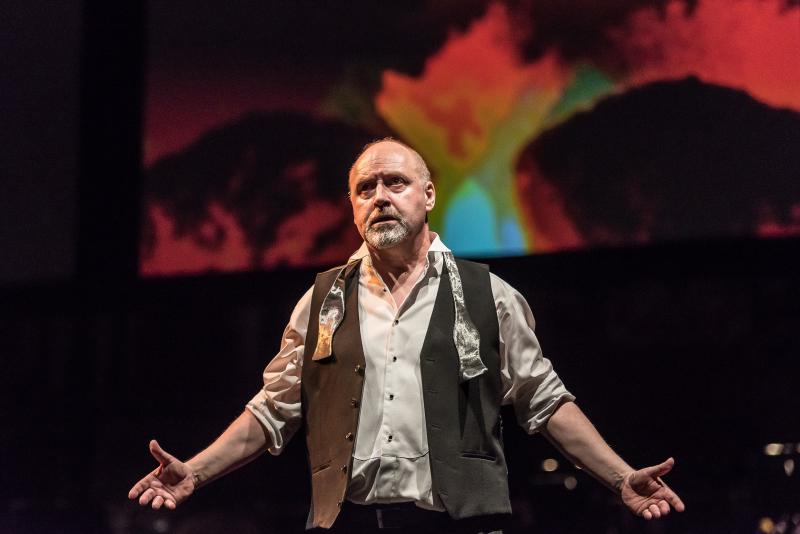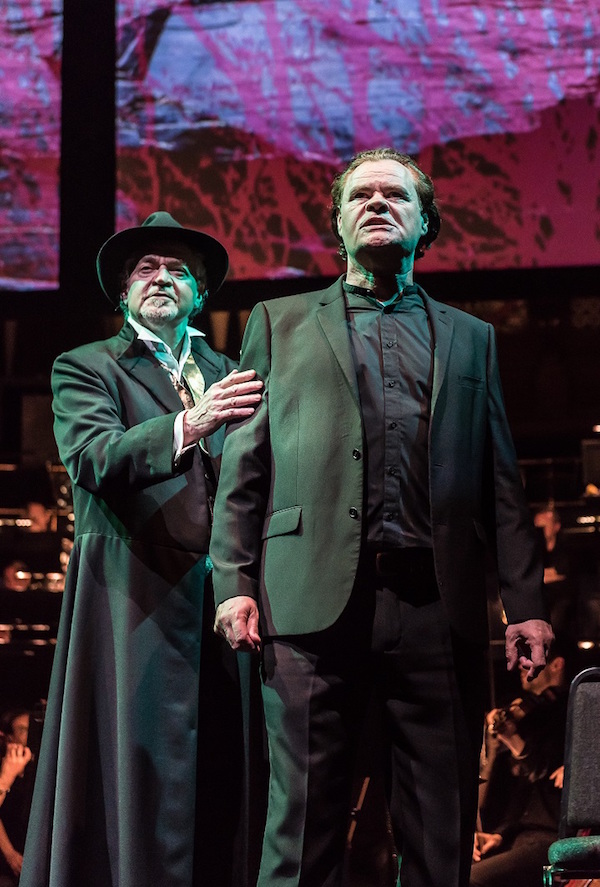Siegfried, Opera North, Southbank Centre | reviews, news & interviews
Siegfried, Opera North, Southbank Centre
Siegfried, Opera North, Southbank Centre
A star soprano shines in the Ring’s conversation piece

For some of us, Siegfried is a perfect opera. Like L.627 it stubbornly observes the Aristotelian rules of space and time to cut a generous slice of life. There are almost no set-pieces to break the flow of one-on-one conversations, accusations, confessions, arguments. These encounters are inevitably stifled by a concert staging, where singers address themselves to us, never to each other.
Wisdom also holds that Siegfried is the Scherzo of the Ring. Maybe not only for its position as the third part of the drama, in symphonic terms, but for its libretto, which banters with wit and irony, wordplay and sudden reversals. The surtitled translation did functional justice to Wagner’s text of Sophoclean nuance. Some of the singers swallowed their words, which didn’t help, but they were heard in solemn, all-too-reverent silence. This may be news to some, but Wagner wrote a few good jokes, most of them in Die Meistersinger and Siegfried, and none of them came over tonight.
 On the podium, Richard Farnes was a model of sobriety and clarity, always finding a bel canto line, in an acoustic never meant for this music. From the stalls we heard much of the Opera North strings, the brass were only let off the leash at climactic moments, the winds took their chances at stylishly controlled solo moments. Having let the Ring alone for 12 years to write Tristan and Die Meistersinger, Wagner built a bonfire of vanities in the Prelude to Act 3, piling on every major motif from the Ring so far. Farnes carefully piled up each log but took too long to light the touchpaper.
On the podium, Richard Farnes was a model of sobriety and clarity, always finding a bel canto line, in an acoustic never meant for this music. From the stalls we heard much of the Opera North strings, the brass were only let off the leash at climactic moments, the winds took their chances at stylishly controlled solo moments. Having let the Ring alone for 12 years to write Tristan and Die Meistersinger, Wagner built a bonfire of vanities in the Prelude to Act 3, piling on every major motif from the Ring so far. Farnes carefully piled up each log but took too long to light the touchpaper.
On this showing, he would make a superb conductor of Liszt and Beethoven. Timbres were light and bright, but violas, tuba and timpani stood out in this most inner-part of operas. Leading to Brünnhilde’s awakening, the first violins took their treacherously exposed solo with exquisite, doubtless exhaustively rehearsed assurance.
In the title role, Lars Cleveman warmed up after a dry first scene. A likely lad who needs a stronger lower register, said Stephen Walsh of his Bayreuth Tannhäuser, and that about sums it up. A size too small for the role, he was at least a size larger than Richard Roberts’ all-too-sympathetic Mime. Only with the Act 2 confrontation between the Wanderer (Béla Perencz) and Alberich (Jo Pohlheim pictured above right) did we hear singing of Wagnerian scale. Mats Almgren brought a properly cavernous bass but also real pathos to the dying Fafner. Within the staging’s literal frame of reference, Jeni Bern made a sweet and pertly sung Woodbird. Ceri Williams found ample time and genuine contralto timbre to sing a hieratically dignified Erda, while hardly evoking the confused earth-mother brought back against her will to a life out of balance.
Only with the appearance of Kelly Cae Hogan’s Brünnhilde was the prosaic context conclusively banished. In the score’s weakest, most extended stretch, she sustained a glorious flood of old-fashioned soprano tone while bringing her character back to joyous, then richly ambivalent and finally exultant life. Hogan’s soprano is more mature, slightly wider, no less thrilling than Rachel Nicholls at Longborough: I’d listen to her again in anything.
Appeals to contemporary relevance can be tiresome, but Simon Rees’s translation hit the spot in the forging scene. "Experts won’t help you, that’s clear," said Mime to Siegfried. "Only his folly helps the fool." The sun set in baleful orange over the House of Commons. Götterdämmerung on Sunday.
- The final instalment of Opera North's Ring at the Southbank Centre is free for spectators of the Clore Ballroom live screening. Full programme of events here
- Read more opera reviews on theartsdesk
rating
Share this article
The future of Arts Journalism
You can stop theartsdesk.com closing!
We urgently need financing to survive. Our fundraising drive has thus far raised £49,000 but we need to reach £100,000 or we will be forced to close. Please contribute here: https://gofund.me/c3f6033d
And if you can forward this information to anyone who might assist, we’d be grateful.

Subscribe to theartsdesk.com
Thank you for continuing to read our work on theartsdesk.com. For unlimited access to every article in its entirety, including our archive of more than 15,000 pieces, we're asking for £5 per month or £40 per year. We feel it's a very good deal, and hope you do too.
To take a subscription now simply click here.
And if you're looking for that extra gift for a friend or family member, why not treat them to a theartsdesk.com gift subscription?
more Opera
 Susanna, Opera North review - hybrid staging of a Handel oratorio
Dance and signing complement outstanding singing in a story of virtue rewarded
Susanna, Opera North review - hybrid staging of a Handel oratorio
Dance and signing complement outstanding singing in a story of virtue rewarded
 Ariodante, Opéra Garnier, Paris review - a blast of Baroque beauty
A near-perfect night at the opera
Ariodante, Opéra Garnier, Paris review - a blast of Baroque beauty
A near-perfect night at the opera
 Cinderella/La Cenerentola, English National Opera review - the truth behind the tinsel
Appealing performances cut through hyperactive stagecraft
Cinderella/La Cenerentola, English National Opera review - the truth behind the tinsel
Appealing performances cut through hyperactive stagecraft
 Tosca, Royal Opera review - Ailyn Pérez steps in as the most vivid of divas
Jakub Hrůša’s multicoloured Puccini last night found a soprano to match
Tosca, Royal Opera review - Ailyn Pérez steps in as the most vivid of divas
Jakub Hrůša’s multicoloured Puccini last night found a soprano to match
 Tosca, Welsh National Opera review - a great company reduced to brilliance
The old warhorse made special by the basics
Tosca, Welsh National Opera review - a great company reduced to brilliance
The old warhorse made special by the basics
 BBC Proms: The Marriage of Figaro, Glyndebourne Festival review - merriment and menace
Strong Proms transfer for a robust and affecting show
BBC Proms: The Marriage of Figaro, Glyndebourne Festival review - merriment and menace
Strong Proms transfer for a robust and affecting show
 BBC Proms: Suor Angelica, LSO, Pappano review - earthly passion, heavenly grief
A Sister to remember blesses Puccini's convent tragedy
BBC Proms: Suor Angelica, LSO, Pappano review - earthly passion, heavenly grief
A Sister to remember blesses Puccini's convent tragedy
 Orpheus and Eurydice, Opera Queensland/SCO, Edinburgh International Festival 2025 review - dazzling, but distracting
Eye-popping acrobatics don’t always assist in Gluck’s quest for operatic truth
Orpheus and Eurydice, Opera Queensland/SCO, Edinburgh International Festival 2025 review - dazzling, but distracting
Eye-popping acrobatics don’t always assist in Gluck’s quest for operatic truth
 MARS, Irish National Opera review - silly space oddity with fun stretches
Cast, orchestra and production give Jennifer Walshe’s bold collage their all
MARS, Irish National Opera review - silly space oddity with fun stretches
Cast, orchestra and production give Jennifer Walshe’s bold collage their all
 Káťa Kabanová, Glyndebourne review - emotional concentration in a salle modulable
Janáček superbly done through or in spite of the symbolism
Káťa Kabanová, Glyndebourne review - emotional concentration in a salle modulable
Janáček superbly done through or in spite of the symbolism
 Buxton International Festival 2025 review - a lavish offering of smaller-scale work
Allison Cook stands out in a fascinating integrated double bill of Bernstein and Poulenc
Buxton International Festival 2025 review - a lavish offering of smaller-scale work
Allison Cook stands out in a fascinating integrated double bill of Bernstein and Poulenc
 Tosca, Clonter Opera review - beauty and integrity in miniature
Happy surprises and a convincing interpretation of Puccini for today
Tosca, Clonter Opera review - beauty and integrity in miniature
Happy surprises and a convincing interpretation of Puccini for today

Add comment